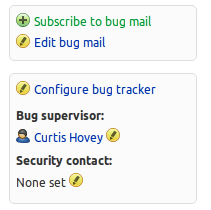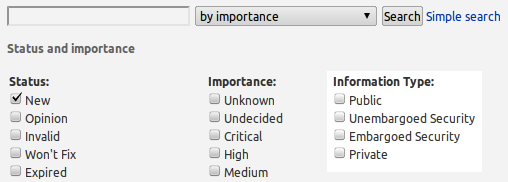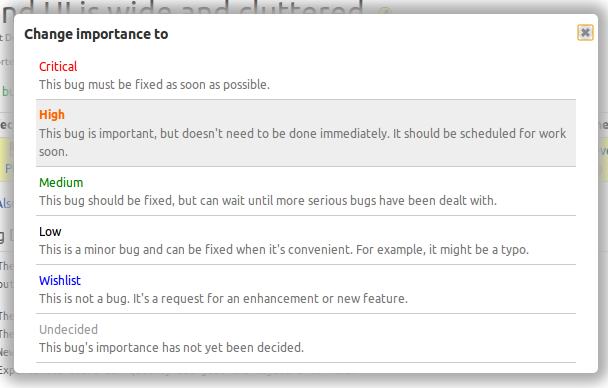
The Purple Squad recently discussed how the forthcoming sharing feature changes project setup. Sharing will allow project maintainers to share kinds of information with users and team. This feature separates access to private information from bug and branch subscriptions. Maintainers do not need to manage hundreds of subscriptions, users do not needs to block unwanted email.
Before sharing, direct subscriptions were the only way Launchpad knew which users the bug or branch was disclosed to. Launchpad would subscribe the maintainer, or the team in a designated role to ensure someone could work with the information in the bug or branch. The subscribed users would then be responsible for subscribing other users and team so that everyone who needs to know about the information could work with it. Most users subscribed to private bugs and branches get unsolicited email. Each user’s project, series, and milestone subscriptions are ignored.
After sharing, subscriptions to projects, series, and milestones will just work. If a private bug matches your project subscriptions, and that kind of information is shared with you, you will get the email. You will be able to subscribe to kinds of information, such as embargoed security.
The security contact role
The security contact role is obsoleted by sharing. It can be removed.
The security contact exists to tell Launchpad which team to subscribe to embargoed security bugs to ensure the information is disclosed to someone. The role does not convey any other privileges. Only one team could be in the role; it was not possible to tell Launchpad that embargoed security bugs should be disclosed to several teams. Sharing allows the maintainer to specify which teams embargoed security information is disclosed to.
The bug listing page implies that no one has access to security information when the role is not set. This was never the case. Launchpad subscribed the maintainer to the bug if no one was in the security contact role. Maybe Launchpad should show a notice to maintainers when it detects that no one is subscribed to get security mail? This presumes email is how users want to be notified. It think this is nice to have, but not a requirement. I would prefer Launchpad to present a log of recent activity on its pages and send me emails that summarise important activity when I have not visited the pages recently.
The bug supervisor role
The bug supervisor looses its private bug responsibilities after sharing. It is still useful to delegated additional bug editing privileges to a team who does not drive development decisions.
The bug supervisor role will be used less often. Most teams currently in the bug supervisor role are also in the driver or maintainer role. Launchpad required maintainers to set the bug supervisor role to ensure that those that plan released can also see the private bugs. Small projects will not need the role. It will only be needed by projects that want to expand the number of contributor who can triage bugs without expanding the number of people who do release management.
The maintainer role
The maintainer role is unchanged by sharing. Well, it responsibilities are unchanged, so we must ensure that the project shares private information with the maintainer by default.
When a project is registered, Launchpad must share each kind of private information with the maintainer. This is rule is not as simple as you might think. Many projects are registered by a user, who sets a team as the maintainer during setup. From Launchpad’s perspective, the project has transferred the role. Launchpad does not know what to do [1]. Some maintainers do not want to work with private information, they delegate to other teams. Launchpad cannot presume that changing the maintainer means changing who private information is disclosed to. Maintainers can always choose to share the information with themselves.
Launchpad’s project setup workflow is incomplete. There are two screens that gather the basic information, but you can set additional information on the project front page. There are five pages to configure how the project uses Launchpad that maintainers should review during setup, but we did not have the time integrate them. We do not want users to do more work. Instead we want Launchpad to present just the essential information and have sensible defaults.
Reimaging/completing project setup is out of scope for the sharing feature, but it might be in scope for the Purple Squads next feature, private projects. During setup, Launchpad needs to know who the maintainer will be and share private information with them. We can consider this work as an enhancement to maintain expected behaviour. We will do this work as a part of the sharing feature. When we work on private projects, we can explore what else project setup and reconfigure needs to do to ensure that information is disclosed to the proper teams. Private projects will also entail making projects public, which means reconfiguring the kinds of information a project has.
[1] If you have ever changed the bug supervisor or security contact, you might know of the pain I am alluding to. Bang head against desk, scream at computer, weep, set aside a few weeks of your valuable time to update all bug subscriptions yourself so that the new team can do it’s job. This whole scenario is implicitly fixed by sharing since subscriptions are not used to manage access.









